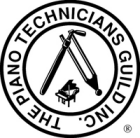Services & Fees
We provide quality, affordable piano service with uncompromised integrity.
Tuning your piano involves the precise adjustment of the approximately 220 strings on your piano. The strings exert around 40,000 pounds of tension on the plate and frame. Changes in humidity, normal use, and basic principles of physics all contribute to a piano going out of tune. Depending on where you live, the amount of humidity fluctuations that your piano is subjected to, the quality and condition of your piano, and how much the piano is played, your piano will likely need to be tuned between one and four times per year.
* Modest travel surcharge may be added for travel 12+ miles.
The pitch on a piano is measured in “cents”, with 100-cent increments between any two adjacent notes. If the overall pitch of the piano has deviated significantly (generally 12-15+ cents), each string needs to be tightened significantly, with the increased tension causing previously tuned notes to deviate. A pitch raise uses a computer-generated overpull formula to compensate for the overall adjustment, allowing for a stable subsequent fine-tuning. The fee is $50 for up to 50 cents flat and $75 for 50+ cents flat.
Common repairs include sticking keys, dead notes, broken strings (bass string – $100, treble string – $60-85), squeaky pedals, and fixing various buzzes, knocks and rattles. Additionally, opting to replace keytops can make an old set of keys look like new again. Many minor repairs are done as a courtesy, but more involved repairs are charged hourly at $100/hour.
Over time, parts swell and shrink, wear out or fatigue, or otherwise warrant adjustment. With over 10,000 moving parts inside of a piano and approximately 20 unique adjustments possible for each individual note, regulation can be a complex task. You may notice the need for regulation if notes on your piano play differently, if notes don’t play when you attempt to play softly, or if notes doubble-strike or sound unusual when played. Regulation can be minor, involving only certain, noticeably problematic notes, or comprehensive, affecting the entire piano. Major regulation work often involves repairing or replacing certain action parts, such as felts and hammers.
Purchasing a used piano is a decision that should be approached with care and caution. What may seem like a great deal could end up being quite the opposite. If you are thinking of buying a used piano from a friend, out of the classifieds, or off of Craigslist, getting input from a qualified technician might be the best investment you make. You don’t want to find out later that the piano you just picked up for a couple hundred $$ or even for free actually is not tunable and/or needs hundreds of $$ of repairs. Besides possibly having paid to have it moved, you now have the burden of disposal. And then you’re back to needing a piano again. Getting it inspected prior to purchase can save you the trouble. Please note that a purchase consultation is different from an appraisal, which is a comprehensive assessment of a piano’s value. During a purchase consultation we will only be able to offer a ballpark idea of the piano’s value.
Many factors contribute to a piano’s value, including, but not limited to, original purchase price, age, condition, equitable replacement value, and geographic region. An appraisal might be needed for insurance purposes or if you are looking to sell the piano. A written appraisal provides the documentation necessary for either. We will provide you with a comprehensive report of your piano’s condition and value.
Proper humidity control tightens or prevents loose tuning pins, keys, action parts, soundboard cracks, and prevents sticking keys, rust on strings, and more. Installation of a Dampp-Chaser system typically costs about $675 for an upright piano and $695 for a grand piano. Discounts available! For more information, see our humidity control page.
Properly treating your piano with the correct cleaners, chemicals, and supplies will be essential to effective smoke odor remediation. Effectively evicting the smoke odors involves removing many piano components and applying a combination of procedures and techniques such as vacuuming, blowing, dry cleaning, chemical treatments, polishing, fogging, and more. Servicing your piano in such a way should be handled by a qualified technician.
We serve...
…individuals, families, schools, churches and organizations who want quality, reliable service for their pianos. The goal is not to just tune your piano, but also to service it, so that you can expect many years of enjoyment out of your special investment.
We work...
…in towns and cities in and around the Lower Bucks County, Pennsylvania, region including Langhorne, Newtown, Yardley, Richboro, Holland, Levittown, Bensalem, Bristol, Fairless Hills, Feasterville, Penndel, NE Philadelphia, and more!

We pledge...
...to provide quality, affordable piano service with uncompromised integrity, honesty and reliability. Customer satisfaction is always 100% guaranteed.
